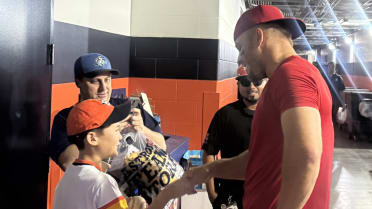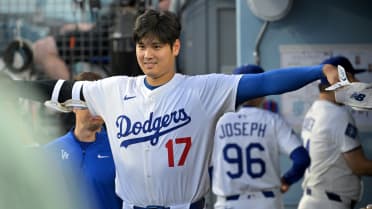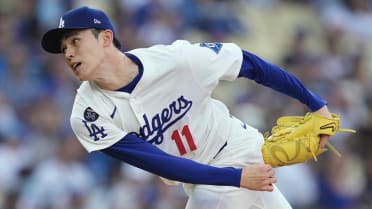
A version of this story was originally published on Feb. 19, 2022.
Imagine Willie Mays and Roberto Clemente in the same outfield for the Giants.
Now imagine you’re the 1954 Dodgers imagining Willie Mays and Roberto Clemente in the same outfield for the Giants.
The Dodgers-Giants rivalry is famous for its long and rich lore, but a little-known chapter in that story gives us one of the more intriguing “what if” scenarios in baseball history.
Clemente is regarded as one of the greatest right fielders of all time, a Hall of Famer who had exactly 3,000 hits and racked up 12 Gold Glove Awards before his tragic death in an airplane accident on Dec. 31, 1972. His Major League accomplishments came in a Pirates uniform, but it wasn’t with that organization that his professional baseball journey began.
In early 1954, after seeing Clemente play in the Puerto Rican Winter League, several Major League teams were showing interest, including the Braves, Red Sox, Cardinals and Giants.
With the rival Giants clearly pursuing Clemente, the Dodgers outbid them with an offer of $10,000 as a signing bonus and a $5,000 first-year salary. The Braves reportedly offered much more, but Clemente wanted to play in New York because he had family and friends there. So he signed with Brooklyn on Feb. 19, 1954.
The Dodgers -- the team of Jackie Robinson, Duke Snider, Roy Campanella, Gil Hodges, Pee Wee Reese and Don Newcombe, which would win the World Series the very next year -- had Roberto Clemente.
But they wouldn’t have him for long.
Back then, there was a rule governing signing bonuses of $6,000 or greater (about $63,000 today) -- if a club signed a player for a bonus at or above that threshold, he had to spend two calendar years on the team’s Major League roster from the date of signing, otherwise he would be eligible for the Rule 5 Draft.
Clemente wasn’t protected from the Rule 5 Draft because he was promptly assigned to Triple-A Montreal. The 19-year-old only played in 87 games for the Royals of the International League in 1954, hitting .257/.286/.372 with two home runs in 155 plate appearances.
According to a 1962 article in The Sporting News, Clemente felt he was being “hidden” from the wider baseball world out of concern that if he played well, he would be taken by another club in the Rule 5 Draft.
“Clemente, on the other hand, felt -- and still does -- that the Royals kept him out of the regular lineup so big league teams would think him a weak prospect and ignore him in the postseason draft for which he’d be available as a bonus player if he weren’t elevated to the Brooklyn roster,” wrote the author of the article, Howard Cohn.
Dodgers general manager Buzzie Bavasi said signing Clemente in the first place was a matter of keeping him away from the Giants, though he reportedly gave multiple reasons for Clemente’s assignment to Triple-A over the years.
The man who was in the GM’s chair for the Pirates at the time of the 1954 Rule 5 Draft (Pittsburgh had the first pick after finishing an MLB-worst 53-101) was none other than Branch Rickey.
Rickey had been the Dodgers’ GM from 1942-50, famously signing Jackie Robinson in 1945 before Robinson broke baseball’s color barrier two years later. Rickey and Dodgers owner Walter O’Malley had a falling out, which led to Rickey’s departure from Brooklyn. Now, even though Rickey initially wasn’t all that impressed with Clemente, he swiped him from his former club.
In his 1955 scouting report, Rickey wrote that while he had been told Clemente had great speed, Clemente’s “running form is bad, definitely bad, and based upon what I saw tonight, he has only a bit above-average Major League running speed.”
Still, there were some undeniable strengths in Clemente’s game that Rickey noted as well.
“He has a beautiful throwing arm,” Rickey wrote. “He throws the ball down and it really goes places … his form at the plate is perfect … I would not class him, however, as even a prospective home run hitter.”
Overall, Rickey’s assessment of Clemente was that while he might eventually become a productive Major League player, that would be years away.
“I do not believe he can possibly do a Major League club any good in 1955,” Rickey wrote in his report. “So, we are stuck with him -- stuck indeed, until such time as he can really help a Major League club.”
Whatever Rickey thought of Clemente’s abilities the first time he saw him, something he told the Pittsburgh Press about two weeks after drafting Clemente proved prescient:
“We may have a sleeper in Roberto Clemente, whom we drafted from Montreal.”
Clemente didn’t hit his stride until 1960, when he earned the first of 12 All-Star selections over the remaining 13 seasons of his career. He won 12 straight Gold Glove Awards from 1961-72, and was a .317/.359/.475 hitter with 240 home runs in an 18-year career with Pittsburgh. He helped the Pirates win the World Series in 1960 and ’71, taking home World Series MVP honors after the Bucs defeated the Orioles in the ’71 Fall Classic.
All of that can be traced back to Nov. 22, 1954, when Rickey and the Pirates drafted Clemente away from the Dodgers for $4,000 (the amount required to be paid to the team from which a “bonus” player was drafted).
History may have turned out quite differently if the Dodgers had placed Clemente on their big league roster in 1954. It might even have turned out differently if Brooklyn hadn’t allowed Clemente to play winter ball in his native Puerto Rico that offseason, where he was sensational after the underwhelming performance for Montreal.
Still another dimension of how things might have been different lies with the Giants -- if they had upped their offer, Clemente’s name may have been on a roster with Mays’.
Mays and Clemente in the same outfield is fun to think about. But it isn’t a purely theoretical exercise because it actually happened, just not with the Giants. When Rickey was taking notes for his scouting report, Clemente was playing left field for the Cangrejeros de Santurce in the Puerto Rican Winter League, and the man in center was Mays.
Together, they combined for seven hits, including a pair of triples from Clemente, in an 11-3 victory over Panama for the Caribbean Series championship on Feb. 14, 1955.
Clemente made his MLB debut two months later against the team that lost him the year before. His first big league hit, an infield single, came in his first plate appearance against the Dodgers at Forbes Field on April 17, 1955. It was the first of 395 hits Clemente would collect against the Dodgers in his career. His .345 batting average against them is the highest he posted against any club in his career.
Perhaps a baseball executive who watched the Dodgers lose Clemente put it best on the day of the 1954 Rule 5 Draft:
“I think the Brooklyn club outsmarted itself in the kid,” White Sox GM Frank Lane told the Associated Press. “It never should have let him play winter ball. That’s where he attracted all the attention.”
Manny Randhawa is a reporter for MLB.com based in Denver.




